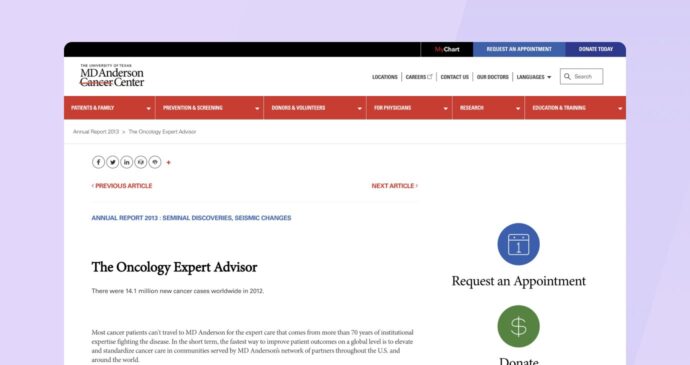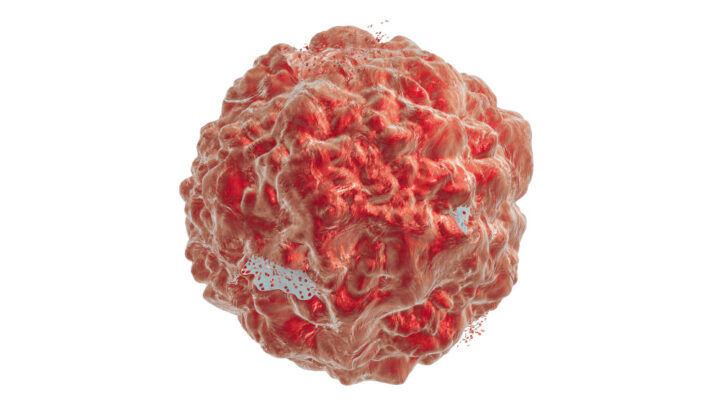
In this guide
Importance of studying tumors and clinical trial designs
Cancer remains one of the leading causes of death globally1. In the past couple of decades cancer research has received a lot of attention. Researchers have dedicated time and effort towards studies on causes, disease progression and pathophysiology, detection methods, treatments and palliative care. While some studies have led nowhere, some have been impactful and yielded innovative breakthroughs. For instance, studies have led to a deeper understanding of tumor progression and this has been helpful in designing more precise therapies.
Continuous efforts are still required for better cancer prevention, diagnosis, and cure. Physicians definitely play a significant role in cancer research study. According to a Sermo poll, 63% of physicians had participated in a cancer research study and 69% of physicians indicated interest in participating or conducting a cancer research study. Perhaps, you are also interested in contributing to malignant tumor studies but not sure what role best suits you as a physician.
This article focuses on how physicians can participate, keep up with advancements, and the future of cancer cell investigation.

The importance of cancer treatment research
Cancer is a complex disease and has a huge burden in the United states and globally. Its incidence has been projected to increase in the near future. By 2040, the number of new cases per year is estimated to increase to 29.5 million and the number of cancer-related deaths to 16.4 million across the globe2.
To combat the devastating effect of growing cancer rates, the study of cancer and its treatment is important. In the last decade, we have seen ground-breaking advances that have revolutionized patient outcomes and survival rates. As researchers continuously study genetic material, cell division, and cell signals, better and more innovative treatments can be designed to fight cancer.
Cancer research is also important for improvements in diagnosis and detection methods. Conventional tumor diagnosis involves the analysis of normal tissue, disease tissue, and cytology specimens obtained through a tumor biopsy procedure to examine physical appearance and to determine whether a tumor is malignant3. Advancements in molecular medicine have allowed more in depth analysis of tumor markers in cancer studies.
Sophisticated technologies in ultrastructure, light microscopy, enzyme histochemistry, immunohistochemistry and molecular diagnostics have revolutionized how cancer is detected and characterized4. Researchers have used these technologies and have obtained deeper understanding of cancer cells and their uncontrolled proliferation.
Cancer research study can also help to identify the cause and risk factors of certain cancers. The underlying causes of many cancers remain a puzzle but thanks to research certain causes and risk factors have been established. Over the years, the understanding of cancer and its causes have improved. Several studies have revealed certain carcinogens like specific chemicals and viruses. With continuous investigation, better steps towards prevention can be taken.
Another reason why researching malignant tumors matter is to improve the management of cancer. This disease is often debilitating with severe symptoms, treatment side effects and secondary effects such as poor appetite and mental health disruptions. Better supportive and palliative care methods are needed to help patients navigate the course of the disease better. The disease can also present a huge burden on a patient’s loved ones and caretaker. There is still a need to find ways that cancer and its treatment can have less consequences for patients and their loved ones.

What role do physicians play in cancer research studies?
The most obvious role of physicians in cancer care is in diagnosis, treatment and care of patients. However, we are currently in very interesting times in cancer research that requires multidisciplinary collaborations to arrive at more innovative breakthroughs. Besides physicians’ active contribution to the diagnosis and comprehensive management of patients, physicians can participate in different capacities to support cancer research. Here are a few roles physicians and oncologists can participate in to deliver meaningful impact.
Laboratory/bench research
For physicians who enjoy discovery, they can channel their training and expertise towards significant laboratory work for cancer treatment research. Such physicians are not only essential to discovery and pre-clinical studies but also play a significant role in translational research.
Many physician scientists have contributed to interesting cancer discoveries and developments such as retroviral oncogenes and gene-targeted therapies5. Studying healthy cells, stem cells, DNA repairs, specific antigens, chemotherapy and other therapy efficacy and side effects all move the needle forward.
Translational research
Translational medicine involves interpreting and integrating new knowledge obtained from research into clinical practice and in the same way using observations from clinical practice to improve pre-clinical research6. Its bidirectional approach is necessary for development of disease-targeted therapies and for improving standard treatment efficacy.
Physicians lie at the heart of clinical investigation and clinical practice. Consequently, they are in the best position to drive translational research to promote innovation of new therapies.
Shaping and informing clinical trials
A very essential part of drug development and cancer treatment research is a clinical trial. Clinical trials are most often conducted in phases- Phase 1, Phase 2 and Phase 3. Doctors, particularly those with a specialty in oncology, can help in developing clinical trial protocols. Doctors, because of their experience and training, can help define the end-point for clinical studies and other solid tumor study designs. They can also help define the right patient population to be included in a clinical trial based on age, damaged cells, genes, tumor spread, severity of disease, and other prognostic factors.
Defining and modifying treatment recommendations
With novel breakthroughs for the treatment of cancer into clinical practice, there is a need to update the standards of care to more effective options. To bolster DNA repair, help the body work properly, and beat most cancers, it often requires combining therapies. Additionally, doctors must also consider co-existing diseases and minimize side effects.
Arriving at these recommendations requires collective research effort and collaborations of doctors. Doctors have specialized training and experience with patient-level care that enables them to make sound decisions about the most effective and safe recommendations for different patient groups regarding the person’s cancer.

Pass down clinical knowledge to young doctors and medical students
Cancer research is continuously evolving and its rapid advancement is dependent on the understanding of previous discoveries and developments. Knowledge management is a very important aspect of research and training the next generation of doctors and researchers is essential. Physicians can advance cancer investigation by educating young doctors and medical students about the latest developments in diagnosis and management.
Participate in medical research surveys
For physicians who want to contribute to cancer investigation but in a more flexible manner, medical research surveys are an excellent option. Medical industry for physicians are commonly paid online surveys. By participating in surveys, physicians with a specialty in oncology can give real-world insights from their experience with patients. These insights are valuable to pharmaceutical companies and contribute to cancer treatment analysis and development.
The latest technologies in cancer cell treatment research
The way cancer is treated has changed over the years, offering hope to patients everywhere. Advances in tech to better understand normal cell and cancer cell growth are promising. The survival rate was 49% in the mid-1970s and has since increased to 68%.Five-year survival rates have been consistently rising for even longer.
Today, we have seen breakthrough treatments that have revolutionized health care and outcomes – thanks to new technology. Here are some of the recent technology advancements in cancer treatment research.

CRISPR
According to a Sermo poll, 46% of Sermo physicians see CRISPR as the most important cancer research treatment technology. With CRISPR, gene editing has never been better. This sophisticated technology allows scientists to access DNA and alter pieces of DNA by deleting and/or inserting parts of the DNA in a cell. CRISPR technology is used today in cancer research and has the potential to transform cancer research and treatments. CRISPR has been used in studies on cancer for various purposes including modifying immune cells to boost the immune system to kill cancer cells. Detecting specific antigens, protein signals, and target cancer cells7.
TeleHealth
Telehealth is a growing concept that allows patients access cancer treatment and care remotely. With the COVID-19 pandemic, this has become even more popular and is considered safer and more convenient for patients and doctors. Telehealth platforms have also been used for health monitoring, video consultations and in-home therapies.
Artificial intelligence
Artificial intelligence and machine learning is no new concept in our world today. It is used by many industries to improve daily activities such as online shopping, web search, cybersecurity and social media interaction. In recent times, it has been used in tumor studies to improve diagnosis, predictions and care. By inputting AI with imaging data and population-based records, researchers can analyze diagnostic results faster. They can also derive more precise predictions of cancer incidence as well as organs and cells at risk.

Cryo-electron microscopy
Continuous developments in microscope design have given birth to Cryo-EM. Cryo-EM generates high resolution images of tissue sections, cells and protein molecules. Never before could scientists visualize these molecules at such high resolutions. This allows them to analyze biological structures better and obtain a more complete understanding of how cancer progresses in the body and how cancer cells respond to chemotherapy, surgery, immunotherapy, and other first treatment options. Cryo-EM is a valuable tool in cancer research studies.
Robotic surgery
Years ago, the possibility of this happening was far-fetched but thanks to technological advancements robotic surgeries are here to stay. The major advantage of robotic surgery is that it involves less pain and less blood loss. They allow for shorter hospital stays and faster recovery. Furthermore, with the assistance of a robot, doctors can carry out surgical procedures with more precision, flexibility and control.

Future cell and gene therapies
The cancer care community worldwide has celebrated a lot of revolutionary treatments in the last few decades. Innovative therapies such as CAR-T-cell therapy, precision medicines and radiation therapy have been instrumental to improving survival outcomes significantly.
But there is still a need for new treatments especially for high risk and advanced cancers that are difficult to treat. Patients and caretakers, whose voices should be considered in cancer research, also report how much they desire cancer drugs with less side effects. Hence, drugs in the future should focus on safe and efficacy.
In the next couple of years, cancer treatment research will prioritize precision medicine. The medical community has witnessed how targeted therapies and immunotherapies have transformed cancer treatments. There is a buzzing excitement of the potential of more individualized therapies. With precision medicine, cancer treatments can be tailored to match each person’s genetic composition and history. These therapies can be more effective with less side effects than conventional treatment options8.
Future studies will also delve deeper into cell-based therapy, an immunotherapy strategy that positions the body’s immune cells to recognize antigen signals and attack dangeours tumors. This treatment method, also known as chimeric antigen receptor therapy, or CAR therapy, has demonstrated efficacy in treatment of blood cancers and so far six CAR T-cell therapies have been approved by the Food and Drug Administration9. This new paradigm of treatments can create more therapeutic options for other types of cancer including solid tumors.
Other new approaches that offer promise include drug repurposing. Common generics which are used to treat other diseases are being researched to study their effectiveness in preventing cancer. A good example is Aspirin, an anti-inflammatory drug, which has been evaluated in a number of studies for reducing the likelihood of cancer10. Researchers have assessed other drugs like antibiotics, non-steroidal anti-inflammatory, cardiovascular, antidepressants, and antipsychotic drugs for their anti-tumoural effect11
Doctors who have a keen interest in oncology should keep abreast with these innovative treatment options and studies so they can give patients the best evidence-based cost effective options.
How to keep up with cancer treatment research?
Cancer treatment research evolves very quickly and because of this, the knowledge a doctor gained during training may be outdated for today’s practice. With the influx of innovative therapies and the advancement of sophisticated technologies used in cancer study, there is a lot more to choose from than what was in the books during medical training.
Mind you, studies and clinical trials never stop. The deluge of novel treatments and tools present both an opportunity and a challenge to the medical oncology community. Doctors have to continuously stay up to date with the changes and evolution of cancer treatments so they can ensure patients get the best outcomes possible.
However, what is not commonly discussed is how doctors can continuously stay in the loop of the changes. Quite frankly, it may be difficult for physicians to stay up to date with all the changes in diagnostic methods and treatments as well as with updates in causes, risk factors and prevention.
The expectation for doctors to incorporate the rapid evolution of knowledge feels insurmountable. 73% of Sermo physicians surveyed report looking up cancer treatment research once a week and 52% of Sermo physicians refer to Medical journals/publications to find resources on cancer treatment research. Nonetheless, relying solely on reading published articles may not be the most effective method. It requires a lot of time skill in refining search on popular search engines.
More effective strategies are needed for doctors to stay updated and to disseminate information. Here are some recommendations:
Leverage the power of community
Physician community groups with common interests are a shortcut to learning what’s most important in very limited time. In such groups, physicians participate in virtual tumor boards, discuss new therapies and studies and share lessons. Sermo is a leading oncology community. You can engage with more than 1 million physicians across 150 countries. Sermo offers a unique physician-first online community that allows clinicians to communicate about critical issues to them and their patients.
If you would like to learn more about cancer treatment research and how physicians can contribute to cancer research, sign up on Sermo today for more.
Leverage on strong partnerships with bigger bodies
No man is an island they say and in cancer research this statement is even more meaningful. Bigger cancer centers and cancer-dedicated research bodies are excellent educational pools. Such centers and national institutes have more expertise than small centers and they also disseminate research findings on their platforms frequently. Some examples are National Cancer Institute, American Cancer Society, the World Health Organization’s International Agency for Research on Cancer (IARC) and the Association of Community Cancer Centers .
Another benefit of doctors partnering with such organizations is that they can easily learn about new and upcoming clinical trials. This way they can easily recognize new treatment options that may benefit their patients and enroll them in clinical studies.
Be proactive about knowledge management – hire someone!
Doctors can learn a thing or two from the legal profession and hire someone to do the research on new therapies and report succinctly to them as needed. Lawyers hire paralegals who carry out research for upcoming cases and considering the volume of information available, it makes sense to adopt this in medical oncology.
This person should have some medical training and excellent research and communication skills. By delegating this responsibility, doctors can focus more on patient satisfaction and outcomes. With this support, they can make better decisions based on recent findings in a timely and effective manner.

Use artificial intelligence
Earlier, artificial intelligence was discussed as an advanced technology that can revolutionize cancer research. Artificial intelligence can also be used in developing smarter medical information systems. Applying machine learning to AI systems to clinical knowledge improves information management and helps doctors synthesize and organize medical information faster and better.
An example of an AI system that helps oncologists stay up to date with advancements in cancer research is the MD Anderson Oncology Expert Advisor powered by IBM Watson. The Oncology Expert Advisor pools clinical data from a diverse patient population, shares updated knowledge on treatments and matches patients with clinical trials. The most attractive feature of this virtual advisor to oncologists is how it organizes and lays out literature including treatment guidelines and research findings relevant to each patient’s case. By doing this, the AI supplies physicians with the best evidence-based treatment options and supports the consideration of new treatments for improved patient outcomes.
Conferences
Attending conferences is also a way to keep up with cancer breakthroughs. Conferences like ASCO and ESMO bring together physicians, researchers, industry representatives and patient advocates to share advances in cancer treatment research amongst other cancer-related topics. It also provides an excellent avenue to network, share ideas and patient findings.
Cancer treatment research is evolving and doing so quickly. The last couple of decades has witnessed the sprout of revolutionary advancements in cancer diagnosis and treatment. But there is still a lot to do–especially as cancer cases are expected to increase. So then, all hands on deck – including physicians.
Physicians are faced with the challenge of managing cancer patients, contributing to cancer research and staying up to date with constant changes It can be really demanding but with these tips, one can forge a path forward.
Don’t go it alone. Take advantage of a community of physicians that shares experiences and actionable insights by joining Sermo. To get started, create your free Sermo account now.















